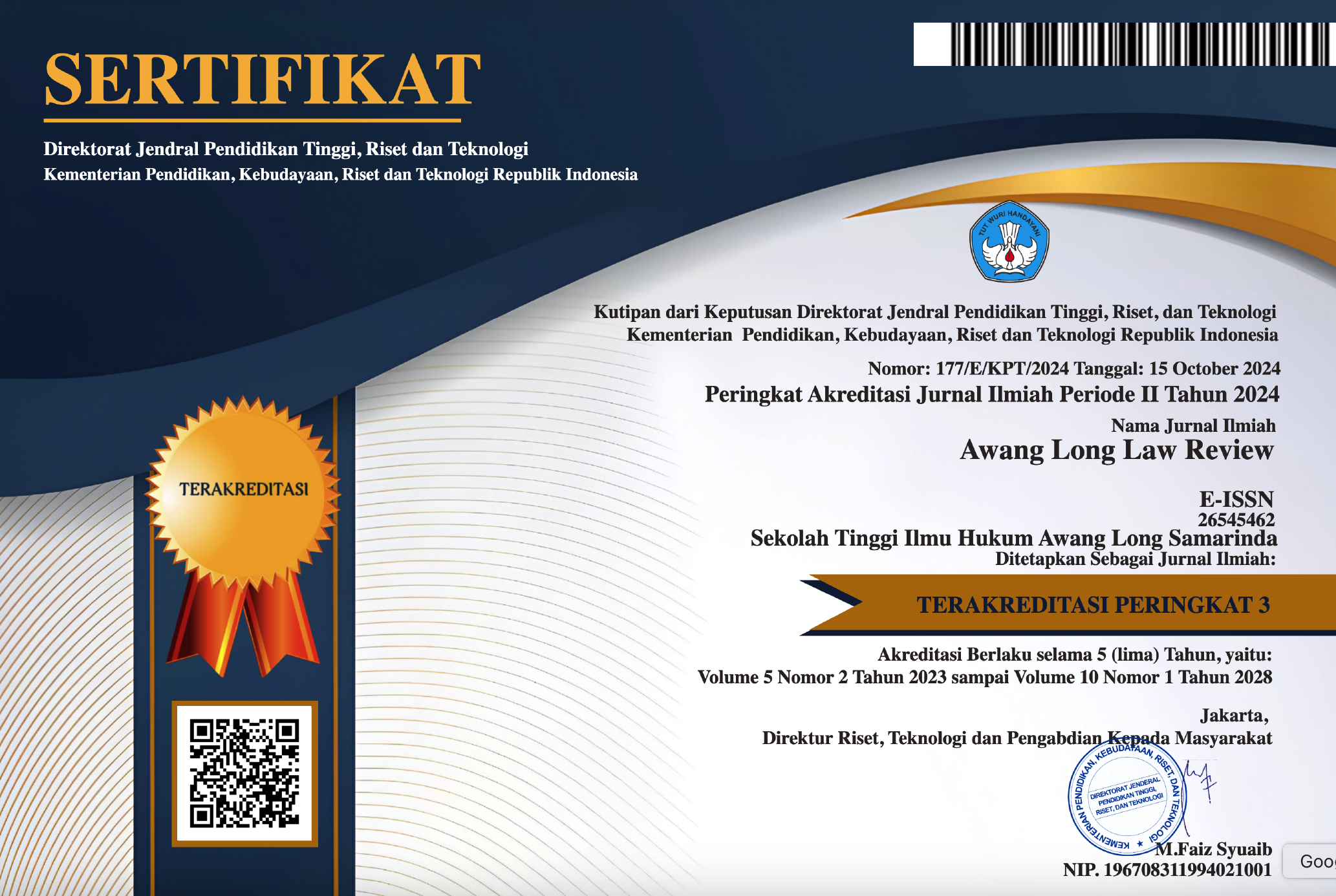ANALYSIS OF CHANGES IN ENVIRONMENTAL LAW AFTER THE ENACTMENT OF THE JOB CREATION LAW
Abstract
Indonesia is a country full of natural resources, which are of extraordinary value in terms of ecology and social. Only, this is not accompanied by regulatory arrangements that are principled in sustainable development goals. The government is an institution that is obliged to ensure that the development is being carried out, although should be profitable in investment terms, must still ensure the preservation of nature. It is just that, because there are so many articles (over capacity) in the act that overlap (over lapping) each other, the government is stuck in a condition to simplify its regulations without paying attention to the preservation side of the environment. This is, evidenced by the use of omnibus law, which is a system of simplifying regulations by revising, changing or deleting articles that are considered inefficient. One of the impacts of this method implementation is the change in the Environmental Protection and Management Law, which is changed into the Job Creation Law, which then revoked by Government Regulation in Lieu of Law Number 2 Year 2022. This law is alleged to have an impact on preservation of the environment due to the loss of the essence of the Environmental Protection and Management Law document importance. Thus, this study focuses on looking at changes in these articles and their impact using the descriptive method of analysis, by discussing existing articles as a basis. The results of this study show that the change of the Environmental Protection and Management Law into the Job Creation Law, which then revoked by Government Regulation in Lieu of Law Number 2 Year 2022, has an impact on Environmental Regulations, Environmental Permits, as well as the preparation of Environmental Protection and Management Law and the provision of environmental impact assessments information to the public.
Downloads
References
Andhini, A. S. D., & Arifin, R. (2019). Analisis Perlindungan Hukum Terhadap Tindak Kekerasan pada Anak di Indonesia. Ajudikasi : Jurnal Ilmu Hukum, 3(1), 41. https://doi.org/10.30656/ajudikasi.v3i1.992
Chamdani, C., Endarto, B., Kusnadi, S. A., Indradjaja, N., & Syafii, S. (2022). Analisis kedudukan Undang-undang Cipta Kerja setelah Putusan MK Nomor 91/PUU-XVIII/2020. Jurnal Panorama Hukum, 7(1), 48–57. https://doi.org/Prefix 10.21067
Dinda Riskanita. (2019). UPAYA PEMERINTAH DAERAH MENGATASI KERUSAKAN LINGKUNGAN AKIBAT ALIH FUNGSI LAHAN BERDASARKAN KONSEP NEGARA KESEJAHTERAAN. Jurnal Penelitian Hukum, 28, 123–134.
Febriyanti, D., Aini, S. N., Resta, A. V., & P, R. B. P. K. (2021). Fungsi AMDAL dalam pengendalian kerusakan dan pencemaran lingkungan setelah diundangkannya UU Cipta Kerja. Widya Pranata Hukum, 3(2).
Hardiyanti, M., & Aminah, A. (2019). TINJAUAN YURIDIS TERHADAP PRINSIP PEMBERDAYAAN MASYARAKAT DAN PEMBANGUNAN BERKELANJUTAN DALAM PENGELOLAAN SUMBER DAYA HUTAN DI PULAU JAWA. Bina Hukum Lingkungan, 4(1). https://doi.org/10.24970/bhl.v4i1.92
Mayasari, I. (2020). KEBIJAKAN REFORMASI REGULASI MELALUI IMPLEMENTASI OMNIBUS LAW DI INDONESIA. Jurnal Rechts Vinding: Media Pembinaan Hukum Nasional, 9(1). https://doi.org/10.33331/rechtsvinding.v9i1.401
Peraturan Pemerintah Pengganti Undang-Undang Republik Indonesia Nomor 2 Tahun 2022 Tentang Cipta Kerja. (n.d.).
Prabowo, A. S., Triputra, A. N., & Junaidi, Y. (2020). Politik Hukum Omnibus Law di Indonesia. Pamator Journal, 13(1). https://doi.org/10.21107/pamator.v13i1.6923
Purniawati, P., Kasana, N., & Rodiyah, R. (2020). Good Environmental Governance in Indonesia (Perspective of Environmental Protection and Management). The Indonesian Journal of International Clinical Legal Education, 2(1). https://doi.org/10.15294/ijicle.v2i1.37328
Setianingtias, et al. (2019). PEMODELAN INDIKATOR TUJUAN PEMBANGUNAN BERKELANJUTAN DI INDONESIA MODELING INDICATORS OF SUSTAINABLE DEVELOPMENT GOALS IN INDONESIA.
Subagiyo, H. (2014). JAMINAN AKSES INFORMASI DALAM PERLINDUNGAN DAN PENGELOLAAN LINGKUNGAN HIDUP (REKOMENDASI PENGUATAN HAK AKSES INFORMASI LINGKUNGAN). Jurnal Hukum Lingkungan Indonesia, 1(1). https://doi.org/10.38011/jhli.v1i1.171
SUDARWANTO, A. S., & Kharisma, D. B. (2020). OMNIBUS LAW DAN IZIN LINGKUNGAN DALAM KONTEKS PEMBANGUNAN BERKELANJUTAN. Jurnal Rechts Vinding: Media Pembinaan Hukum Nasional, 9(1). https://doi.org/10.33331/rechtsvinding.v9i1.411
Sukananda, S., & Nugraha, D. A. (2020). Urgensi Penerapan Analisis Dampak Lingkungan (AMDAL) sebagai Kontrol Dampak terhadap Lingkungan di Indonesia. Jurnal Penegakan Hukum Dan Keadilan, 1(2). https://doi.org/10.18196/jphk.1207
Zulkarnain, C. S. A. (2020). PEMENUHAN HAK AKSES ATAS INFORMASI AMDAL DI INDONESIA: PENGUATAN REGULASI DAN OPTIMALISASI SISTEM ELEKTRONIK. Jurnal Poros Hukum Padjadjaran, 2(1). https://doi.org/10.23920/jphp.v2i1.253
Copyright (c) 2023 Nobella Indradjaja, Chamdani

This work is licensed under a Creative Commons Attribution-ShareAlike 4.0 International License.







